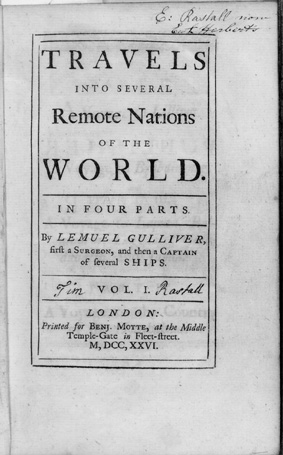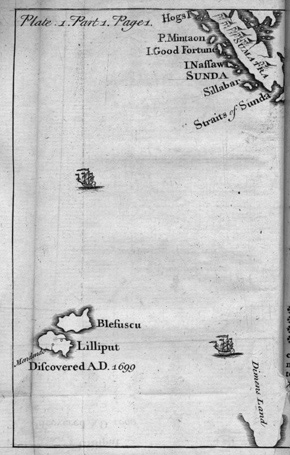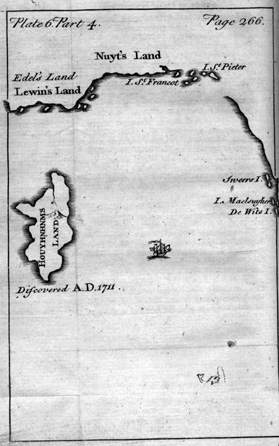
Signifying reality with maps:
Kingdoms of Lilliput and Blefuscu (near Sumatra):
Features of the satire
Title page of the 1st edition of the Travels: note title and author

Signifying reality with maps:
Kingdoms of Lilliput and Blefuscu (near Sumatra):


2) use of ironic indirection to produce an active reader
3) brutally explicit to the point of vulgarity4) cleanse the world by driving evil out
The Travels as Enlightenment Science fiction, but what is s/f?
| Philip K. Dick writes that science fiction is "not
merely a story set in the future, and it not merely a story featuring
high technology… |
Two key elements:
What is the conceptual dislocation of the 1st voyage? what are its effects?
| What if men and women were 6 inches tall? How do they look different? |
| 30: Proclamation: "GOLBASTO MOMAREN EVLAME GURDILO SHEFIN MULLY ULLY GUE, most Mighty Emperor of Lilliput, Delight and Terror of the Universe, whose Dominions extend five thousand Blustrugs (about twelve miles in circumference) to the Extremities of the Globe; Monarch of all Monarchs, taller than the Sons of Men; whose Feet press down to the Center, and whose Head strikes against the Sun:") |
|
Are the Lilliputans fair in their treatment of Gulliver? What does Gulliver's response suggest about his character? How does this text represent the difference between the big-endians and the small-endians? |
| How does size effect the Lilliputan desire to dominate another people? |
| 40: His Majesty desired I would take some other Opportunity of bringing all the rest of his Enemy's Ships into his Ports. And so unmeasurable is the Ambition of Princes, that he seemed to think of nothing less than reducing the whole Empire of Blefuscu into a Province, and governing it by a Vice-Roy; of destroying the Big-Endian Exiles, and compelling that People to break the smaller end of their Eggs, by which he would remain the sole Monarch of the whole World. But I endeavoured to divert him from this Design, by many arguments drawn from the Topicks of Policy as well as Justice: And I plainly protested, that I would never be an Instrument of bringing a Free and Brave People into Slavery. And when the Matter was debated in Council , the wisest part of the Ministry were of my Opinion. |
What is the conceptual dislocation of the 4th voyage?
1: A reversal: not man but horses are the rational and governing specie
2: the human equivalents, the Yahoos, are brute, low, irrational.
3: the Houyhnhnms use perfect reason in all their social life:
|
| In the 1st encounter there's a category problem for Gulliver: where do I fit in? |
|
215-216: At last I beheld several Animals in a Field, and one or two of the same kind sitting in Trees. Their Shape was very singular and deformed, which a little discomposed me, so that I lay down behind a Thicket to observe them better. Some of them coming forward near the Place where I lay, gave me an Opportunity of distinctly marking their Form. Their Heads and Breasts were covered with a thick Hair, some frizzled and others lank; they had Beards like Goats, and a long ridge of Hair down their Backs and the fore-parts of their Legs and Feet, but the rest of their Bodies were bare, so that I might see their Skins, which were of a brown buff Colour. They had no Tails, nor any Hair at all on their Buttocks, except about the Anus; which, I presume, Nature had placed there to defend them as they sate on the Ground; for this Posture they used, as well as lying down, and often stood on their hind Feet. They climbed high Trees, as nimbly as a Squirrel, for they had strong extended Claws before and behind, terminating in sharp points, and hooked. They would often spring, and bound, and leap with prodigious Agility. The Females were not so large as the Males, they had long lank Hair on their Heads, but none on their Faces, nor any thing more than a sort of Down on the rest of their Bodies, except about the Anus, and Pudenda. Their Dugs hung between their Fore-feet, and often reached almost to the Ground as they walked. The Hair of both Sexes was of several Colours, brown, red, black and yellow. Upon the whole, I never beheld in all my Travels so disagreeable an Animal, nor one against which I naturally conceived so strong an Antipathy. So that thinking I had seen enough, full of Contempt and Aversion, I got up and pursued the beaten Road, hoping it might direct me to the Cabbin of some Indian. I had not got far when I met one of these Creatures full in my way, and coming up directly to me. The ugly Monster, when he saw me, distorted several ways every Feature of his Visage, and stared as at an Object he had never seen before; then approaching nearer, lifted up his Fore-paw, whether out of Curiosity or Mischief, I could not tell. But I drew my Hanger, and gave him a good Blow with the flat Side of it, for I durst not strike him with the Edge, fearing the Inhabitants might be provoked against me, if they should come to know, that I had killed or maimed any of their Cattle. When the Beast felt the smart, he drew back, and roared so loud, that a Herd of at least forty came flocking about me from the next Field, houling and making odious Faces; but I ran to the Body of a Tree, and leaning my Back against it, kept them off, by waving my Hanger. Several of this cursed Brood getting hold of the Branches behind, leaped up in the Tree, from whence they began to discharge their Excrements on my Head: However, I escaped pretty well, by sticking close to the Stem of the Tree, but was almost stifled with the Filth, which fell about me on every side. In the midst of this Distress, I observed them all to run away on a sudden as fast as they could, at which I ventured to leave the Tree, and pursue the Road, wondring what it was that could put them into this Fright. But looking on my Left-hand, I saw a Horse walking softly in the Field: which my Persecutors having sooner discovered, was the Cause of their Flight. The Horse started a little when he came near me, but soon recovering himself, looked full in my Face with manifest Tokens of Wonder: He viewed my Hands and Feet, walking round me several times. I would have pursued my Journey, but he placed himself directly in the way, yet looking with a very mild Aspect, never offering the least Violence. We stood gazing at each other for some time; at last I took the Boldness, to reach my Hand towards his Neck, with a Design to stroak it using the common Style and Whistle of Jockies when they are going to handle a strange Horse. But this Animal seeming to receive my Civilities with Disdain, shook his Head, and bent his Brows, softly raising up his right Fore-foot to remove my Hand. Then he neighed three or four times, but in so different a Cadence, that I almost began to think he was speaking to himself in some Language of his own |
| The radical critique of the 4th voyage: A change in the security of the subject position from which the voyage to another culture is narrated |
|
Behn, Crusoe, and Gulliver (in the 1st Voyage):
Gulliver à ß the alternative world
Lilliput [with
cultural difference sustained ] These 1st person travel narratives:
|
|
Gulliver in the 4th voyage: 1: Gulliver comes from reader’s world à · he offers a 1st
person narrative of an alternative world to us (1st person
narrative): an ethnography Houyhnhnms
· he becomes someone who
proudly represents our "human" world and history to the
members of the alternative society (Houyhnhnms) · observes Gulliver and listens
to his history · then Houyhnhnm master offers a critical rejoinder to Gulliver: a counter-ethnography of humans as Yahoos IV:7: 251 When I had answered all his Questions, and his Curiosity seemed
to be fully satisfied; he sent for me one Morning early, and commanded
me to sit down at some Distance, (an Honour which he had never before
conferred upon me) he said, He had been very seriously considering
my whole Story, as far as it related both to myself and my Country:
That he looked upon us as sort of Animals to
whose Share, by what Accident he could not conjecture, some small
Pittance of Reason had fallen, whereof we made no other Use than by
its Assistance to aggravate our natural Corruptions, and to
acquire new ones which Nature had not given us: That we disarmed ourselves
of the few Abilities she had bestowed, had been very successful in
multiplying our original Wants, and seemed to spend our whole Lives
in vain Endeavours to supply them by our own Inventions. That as to
myself, it was manifest I had neither the Strength or Agility of a
common Yahoo, that I walked infirmly on my hinder Feet, had found
out a Contrivance to make my Claws of no Use or Defence, and to remove
the Hair from my Chin, which was intended as a shelter from the Sun
and the Weather. Lastly, That I could neither run with Speed, nor
climb Trees like my Brethren (as he called them) the Yahoos in this
Country. |
|
Q: How does
Gulliver respond to the Houyhnhnm world view and this interpretation
of him as a Yahoo?
|
Friday's assignment on Gulliver’s
Travels, book IV: prepare for the debate on Voyage 4.